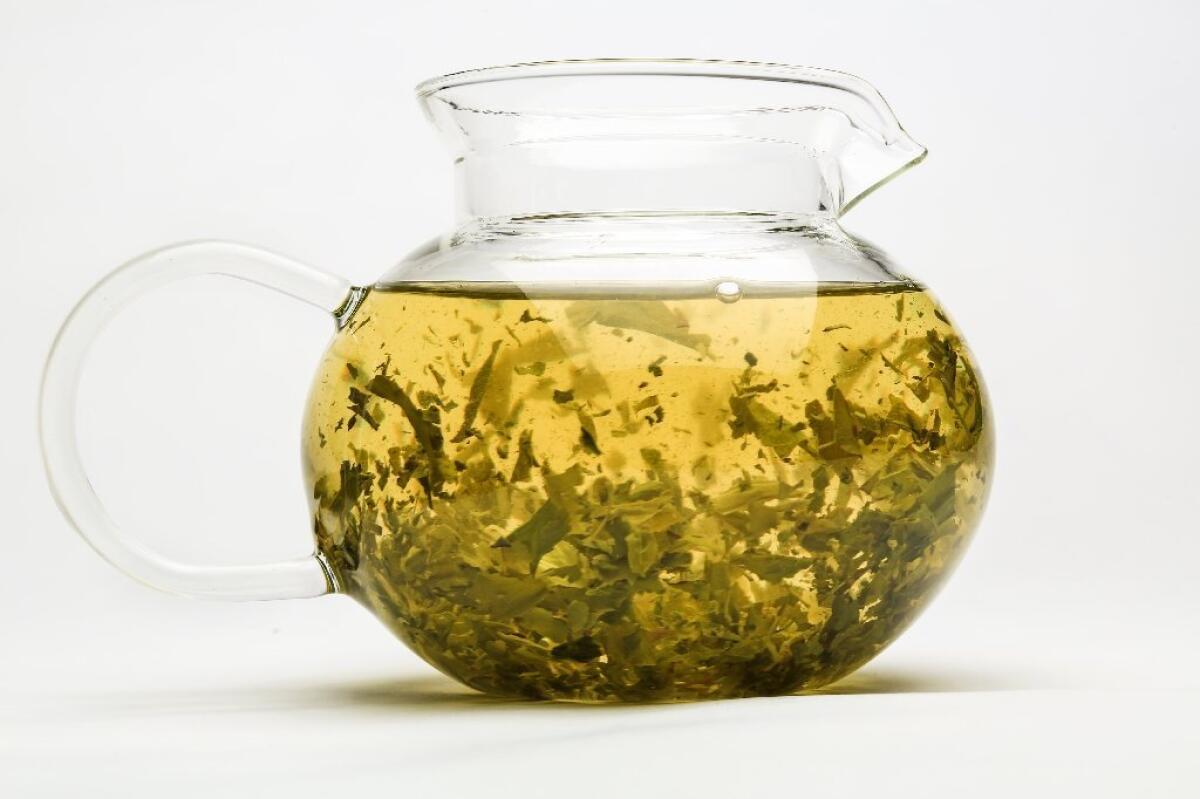Green tea disease-fighting compounds may weaken blood pressure drugs

- Share via
As far as scientists can tell, green tea has many health benefits. It contains natural antioxidants called flavonoids that appear to reduce the risk of cardiovascular disease, stroke and various types of cancer, including cancers of the breast, lung and skin. Plus it tastes good.
But a new report in the journal Clinical Pharmacology & Therapeutics flags a possible problem with green tea: It may prevent the body from absorbing a drug used to treat high blood pressure, probably due to one of the antioxidants for which it is prized.
The study from researchers in Japan and Europe builds on their earlier studies involving rats. After they gave the rats a pill of green tea extract, the animals’ ability to absorb the same drug in their blood declined significantly. Other studies suggested that the antioxidants in green tea inhibited some of the proteins that carry molecules of drugs through and between cells.
RELATED: Foods that affect your risk of cancer
To get an idea of about how green tea might affect people, the researchers recruited 10 healthy adults -- eight men and two women. All were nonsmokers between ages 20 and 30, none were overweight, and none used medications regularly.
The volunteers drank three cups of green tea or water every day for two weeks. Then they took a 30-milligram dose of nadolol, a beta blocker used to treat high blood pressure. (In the U.S., it is sold under the trade name Corgard and is a component of another drug called Corzide.) After a two-week break, the volunteers switched to the other beverage and took the drug again.
When the researchers tested the volunteers’ blood, they discovered that the concentration of nadolol was 76% lower after drinking green tea for two weeks than it was after drinking plain water. In addition, the amount of nadolol detected in their urine was about 80% lower after they drank green tea regularly. This was interpreted as a sign that the drug wasn’t absorbed as well by the body.
The researchers also used cells in lab dishes to see if they could figure out which proteins were responsible for transporting nadolol into cells. Their experiments suggested that the key proteins were inhibited by EGCG, an antioxidant that is abundant in green tea.
Though the study was small and preliminary, the researchers concluded that “patients treated with nadolol should avoid taking green tea.”
They also noted: “Since green tea is consumed worldwide and its extract is one of the most common herbal supplements, the likelihood of concomitant use of green tea and medicines is thought to be increasing.”
Green tea isn’t the first beverage found to interfere with the body’s ability to absorb medications. Grapefuit juice will cause the body to absorb too much of some kinds of statins, which are prescribed to help people reduce their cholesterol. If the concentration of statins is too high, patients could be at risk of liver damage and other problems, the Food and Drug Administration warns.
Blood pressure drugs, anti-arrhythmia drugs, anti-anxiety drugs and antihistamines can also be affected by grapefruit juice, the FDA adds. Other citrus juices, including some types of orange juice, can have a similar effect.
[For the Record, 5:35 p.m. PST Jan. 14: An earlier version of this post mispelled the trade name of the drug nadolol. It is Corgard, not Corgrad.]
If you’re interested in the latest medical studies, you’ll like the things I write about. Follow me on Twitter and “like” Los Angeles Times Science & Health on Facebook.



